[推荐精选]Unit 1 Life On Mars上课学习上课学习教案
最新-九年级英语下册 Unit 1 Life on Mars教案1 牛津
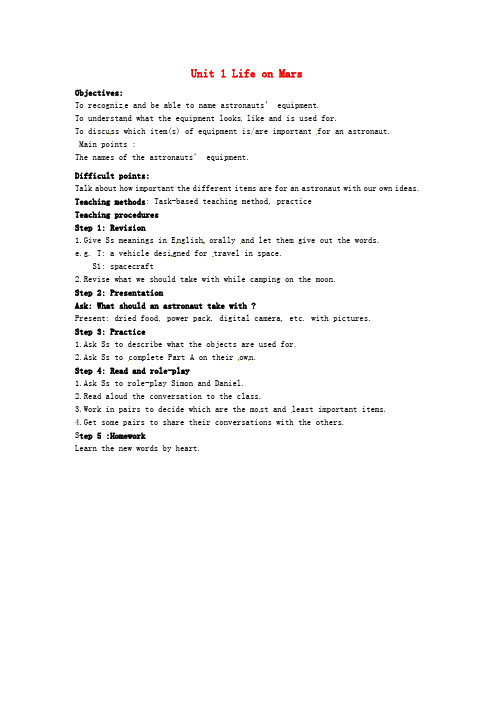
Unit 1 Life on MarsObjectives:To recogniz e and be able to name astronauts’ equipment.To understand what the equipment looks like and is used for.To discuss which item(s) of equipment is/are important for an astronaut.Main points :The names of th e astronauts’ equi pment.Difficult points:Talk about how important the different items are for an astronaut with our own ideas. Teaching methods: Task-based teaching method, practiceTeaching proceduresStep 1: Revision1.Give Ss meanings in E nglish orally and let them give out the words.e.g. T: a vehicle desi gned for travel in space.S1: spacecraft2.Revise what we should take with while camping on the moon.Step 2: PresentationAsk: What should an astronaut take with ?Present: dried food, power pack, digital camera, etc. with pictures.Step 3: Practice1.Ask Ss to describe what the objects are used for.2.Ask Ss to complete Part A on their ow n.Step 4: Read and role-play1.Ask Ss to role-play Simon and Daniel.2.Read aloud the conversation to the class.3.Work in pairs to decide which are the mo st and least important items.4.Get some pairs to share their conversations with the others.S tep 5 :HomeworkLearn the new words by heart.。
九年级英语下册《Unit 1 Life on Mars》教案 牛津版
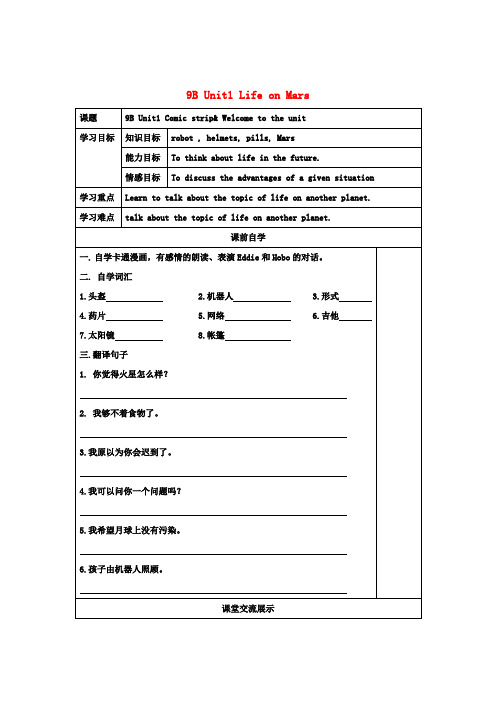
9B Unit1 Life on Mars参考答案Unit1 Life on Mars 10-1选择1-5 D A B C C10-21.难以想象 be many ways10-3一、单项选择1-5 B B B D A 6-10 D C D B A10-4一、单词拼写A. 根据句意,用括号内所给词的正确形式填空。
1. crowded2. 5. ScientistsB. 根据所给中文和句意,填入正确的单词。
6. Gravity7. survive8. provide9.floating 10.settersC. 用所给动词的正确形式填空。
11. feel 12. traveling 13.to live 14. listening 15. playing二、完形填空1-5 DACDB 6-10 CBACD10-5一. 选择1-5 B B C C C 6-7 D C10-6一、完成句子1. who is the best2. ’t forget二.翻译句子1.What do you think of the life on Mars? 2.I don’t know wha t life will be like in the future.3.It’s great to let the robot do all the work for us.4.The journey to Mars may be very uncomfortable.5.We should try to prevent water from polluting.10-7翻译句子1. I thought you liked Mars.2. The journey to space will make people uncomfortable.3. Our country is becoming stronger and stronger.4. Can you tell me whether the gravity on mars is only about three-eighths of the gravity on earth?5. Humans need food, water and air to survive.6. The film on for we got to the cinema.7. I don’t think the story is worth reading. 8. We should learn to look after ourselves.9. It’s a big .10. We must keep the children away from fire.10-8用括号内动词的适当形式填空1. were made to laugh2.10-9Life on MarsIn the future, we can travel to Mar by space shuttle which travels at live on Mars because scientists develop plants that can grow on Mars and can produce food, oxygen and water. The gravity on Mars is only three-eighths of the gravity on Earth, so we should wear special boots to make ourselves Mars, we will live in a dome with many bedrooms and Mars can study at the inter-planet computer network.But the food on Mars will not be as tasty as they are today, and the journey to Mars will probably be very uncomfortable.10-10一、句型转换1、I don’t believe there are any aliens on Mars.2、We all know (that) Earth is becoming more and more crowded.3、Mrs Zhu taught us light travels faster than sound.4、Food can be stored in the fridge for a long time.5、Could you tell me like this?6、Aunt Xu wondered ifwhether living on Mars was safe?二、翻译句子1、I wish I was from Mars.2、We all know ShouzhouVI sent up into space successfully.3、The trip to the space will make people excited.4、Do you know if it takes a long time to travel from The Earth to Mars?5、The animals will be cared for by robots。
九年级英语下册 Unit1 Life on Mars教案 牛津译林版 教案

Unit 1 Life on MarsTeaching aims:To extract information by listening to a TV advertisementTo plete notes about an advervisementTo extract information from a TV discussionTo plete a conversationMain points :To extract information by listening to a TV advertisementTo plete notes about an advervisementTo extract information from a TV discussionDifficult points:To extract information from a TV discussionTeaching methods: Task-based teaching method, practiceTeaching procedures:Step 1. Lead-inDaniel is going to watch a TV programme.On the programme ,people will discuss what it might be like to live on Mars.Step 2. Listen and writeFirst listen to the passage and help Daniel make notes in Part A about if he wants to live on Mars.Step 3. Listen and writeNow listen to the second part of the TV programme ,and try to find out all the information you need to plete Daniel’s lists in Part A2.Check the answers.Tell the students that they can use the notes from page 12 to help them pletePart A3.When they have finished,they pass their answers to another group to check. Step 5. Role-playAsk two students to play the roles of Simon and Daniel.Ask them to read the conversation aloud. Other students listen and answerWould Daniel like to live on Mars?Why?Act the dialogar out.Step 6. DiscussionWould youlike to live on Mars?Why or why not?Homework:Recite the important sentences.。
英语Unit1LifeonMars教案(牛津英语九年级下)

Unit 1 Life on MarsObjectives:To use ‘can’, ‘could’, ‘may’ and ‘might’ to talk about permission.Main points :The usage of ‘can’, ‘could’, ‘may’ and ‘might’.Difficult points:To use ‘may’ and ‘might’ to talk about permission.Teaching methods: Task-based teaching method, practiceTeaching proceduresStep 1: Lead-in1.T: There are different ways of asking for and granting permission. Each way has a different level of formality.2.Go through the tables at the top of page 9. Explain the different levels of formality.Step 2: Presentation1.Explain the context of the exercise.2.Ss complete the exercise on their own.3.Choose several Ss to read the completed questions and answers.4.Ask Ss to write sentences to ask permission in the following Qs(1)Your cousin is watching a boring TV program, you ask her for permission to change thechannel.(2)Your uncle and aunt have invited you to join them for a walk in a park nearby. You wantto bring your dog along.5.Blackboard design6.FeedbackStep3Homework.一. 选择1. —I smoke here ? —No , you mustn’t .A. CanB. MayC. MustD. Need2. —I visit Lucy on Sunday , Mum ? — Yes , you .A. Must ; canB. May ; mayC. Need ; needD. May ; need3. He finish his homework on time .A. need not toB. doesn’t needC. needs toD. needs4. you like to hold the ladder for me ?A. CouldB. ShouldC. WouldD. Must5. John didn’t come to the party , at home .A. he maybeB. maybe heC. he may beD. may be he二. 翻译1.你可以用数码相机拍下高质量的图像.2.Daniel 认为空气罐比干粮更重要.3.我认为对宇航员来说,笔记本电脑是最重要的东西.。
牛津初中英语9B Unit 1 Reading “Life on Mars”教学设计
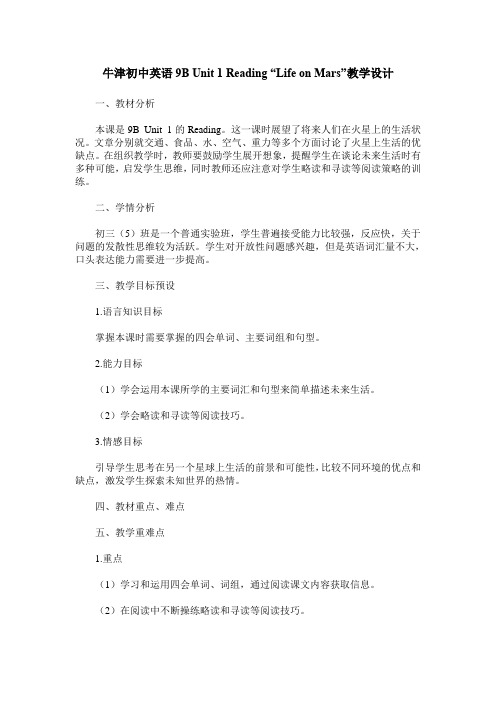
牛津初中英语9B Unit 1 Reading “Life on Mars”教学设计一、教材分析本课是9B Unit 1的Reading。
这一课时展望了将来人们在火星上的生活状况。
文章分别就交通、食品、水、空气、重力等多个方面讨论了火星上生活的优缺点。
在组织教学时,教师要鼓励学生展开想象,提醒学生在谈论未来生活时有多种可能,启发学生思维,同时教师还应注意对学生略读和寻读等阅读策略的训练。
二、学情分析初三(5)班是一个普通实验班,学生普遍接受能力比较强,反应快,关于问题的发散性思维较为活跃。
学生对开放性问题感兴趣,但是英语词汇量不大,口头表达能力需要进一步提高。
三、教学目标预设1.语言知识目标掌握本课时需要掌握的四会单词、主要词组和句型。
2.能力目标(1)学会运用本课所学的主要词汇和句型来简单描述未来生活。
(2)学会略读和寻读等阅读技巧。
3.情感目标引导学生思考在另一个星球上生活的前景和可能性,比较不同环境的优点和缺点,激发学生探索未知世界的热情。
四、教材重点、难点五、教学重难点1.重点(1)学习和运用四会单词、词组,通过阅读课文内容获取信息。
(2)在阅读中不断操练略读和寻读等阅读技巧。
2.难点在理解文章大意的基础上,通过组织教学活动,促进学生思维发展,激发探索未知世界的热情。
五、教学策略教学思路:1.Lead-in(通过视频导出生词并使学生对火星的基本情况有所了解。
)2.First reading (通过skimming的阅读技巧,回答一个基本问题,了解文章大意。
)3.Seconding reading(通过scanning的阅读技巧,先找出各小节的关键词。
然后通过回答问题、改错、填空等活动将文章分块阅读,获取细节信息。
)4. Third reading (通读全文,概括火星生活的优缺点。
)5.Reading for development(通过学生间的采访活动输出阅读获取信息;通过观看人类探索火星取得的成就视频,引发学生思考,升华情感。
unit1lifeonmars英语语法知识点精讲教案
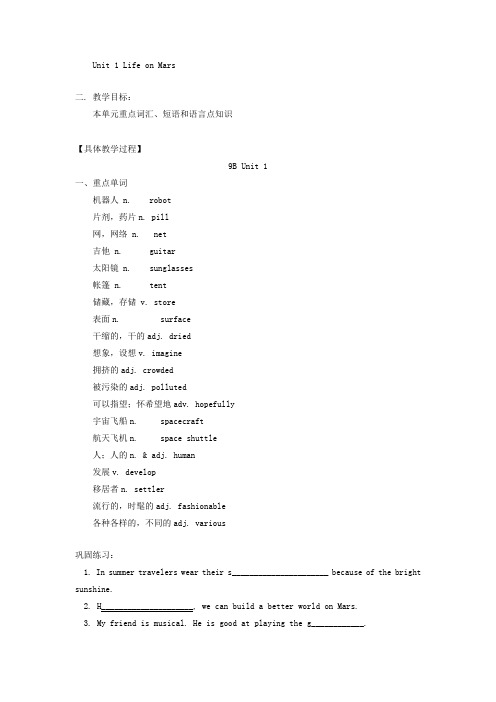
Unit 1 Life on Mars二. 教学目标:本单元重点词汇、短语和语言点知识【具体教学过程】9B Unit 1一、重点单词机器人 n. robot片剂,药片n. pill网,网络 n. net吉他 n. guitar太阳镜 n. sunglasses帐篷 n. tent储藏,存储 v. store表面n. surface干缩的,干的adj. dried想象,设想v. imagine拥挤的adj. crowded被污染的adj. polluted可以指望;怀希望地adv. hopefully宇宙飞船n. spacecraft航天飞机n. space shuttle人;人的n. & adj. human发展v. develop移居者n. settler流行的,时髦的adj. fashionable各种各样的,不同的adj. various巩固练习:1. In summer travelers wear their s______________________ because of the bright sunshine.2. H_____________________, we can build a better world on Mars.3. My friend is musical. He is good at playing the g____________.4. When you are ill, you should take p___________________ on time.5. It’s great that r________________ do all the work for us.6. If you go camping, you should take a t________________ with you.7. Fishing n________________ is useless on the moon.8. Last summer holiday I went to Beijing and I took lots of photos with my c______________9. Scientists should d ________ plants that can grow on Mars.10. The boots will probably become f _________ .二、重点短语1、与某人相处得好 get on well with sb.2、认识某人 get to know sb3、被照顾 be cared for4、使我不开心 make me unhappy5、三副太阳镜 three pairs of sunglasses6、避免漂浮 prevent floating7、连接到氧气罐 be connected to the air tank8、在星球的表面 on the surface of the planet9、到2100年为止 by the year 210010、越来越拥挤和受到污染 more and more crowded and polluted11、3/8的引力 three-eighths of the gravity12、运送大量的人 carry large numbers of people13、飘进太空 float away into space14、不同的设计供定居者选择 different designs for settlers to choose from三、课文结构和语言点知识Paragraph 1: Why we move to Mars?1. Moving to Mars ()move :① move to 搬家,搬迁他家去年搬到加拿大去了。
九年级英语:Unit 1 Life on Mars-

初中英语新课程标准教材英语教案( 2019 — 2020学年度第二学期 )学校:年级:任课教师:英语教案 / 初中英语 / 九年级英语教案编订:XX文讯教育机构Unit 1 Life on Mars-教材简介:本教材主要用途为通过学习英语的内容,提高学生的语言技能,增加一项语言能力,有利于国际化的日常交流、生活、工作等,本教学设计资料适用于初中九年级英语科目, 学习后学生能得到全面的发展和提高。
本内容是按照教材的内容进行的编写,可以放心修改调整或直接进行教学使用。
unit 1 life on mars一. 教学内容:unit 1 life on mars二. 教学目标:本单元重点词汇、短语和语言点知识【具体教学过程】9b unit 1一、重点单词机器人 n. robot片剂,药片n. pill网,网络 n. net吉他 n. guitar太阳镜 n. sunglasses帐篷 n. tent储藏,存储 v. store表面n. surface干缩的,干的adj. dried想象,设想v. imagine拥挤的adj. crowded被污染的adj. polluted可以指望;怀希望地adv. hopefully 宇宙飞船n. spacecraft航天飞机n. space shuttle人;人的n. & adj. human发展v. develop移居者n. settler流行的,时髦的adj. fashionable 各种各样的,不同的adj. various巩固练习:1. in summer travelers wear their s____ because of the bright sunshine.2. h_____, we can build a better world on mars.3. my friend is musical. he is good at playing the g____.4. when you are ill, you should take p_____ on time.5. it’s great that r____ do all the work for us.6. if you go camping, you should take a t____ with you.7. fishing n____ is useless on the moon.8. last summer holiday i went to beijing and i took lots of photos with my c____9. scientists should d ____ plants that can grow on mars.10. the boots will probably become f _____ .二、重点短语1、与某人相处得好 get on well with sb.2、认识某人 get to know sb3、被照顾 be cared for4、使我不开心 make me unhappy5、三副太阳镜 three pairs of sunglasses6、避免漂浮 prevent floating7、连接到氧气罐 be connected to the air tank8、在星球的表面 on the surface of the planet9、到21XX年为止 by the year 210010、越来越拥挤和受到污染 more and more crowded and polluted11、3/8的引力 three-eighths of the gravity12、运送大量的人 carry large numbers of people13、飘进太空 float away into space14、不同的设计供定居者选择 different designs for settlers to choose from三、课文结构和语言点知识paragraph 1: why we move to mars?1. moving to mars (l.1)move :① move to 搬家,搬迁他家去年搬到加拿大去了。
9B Unit1 Life on Mars
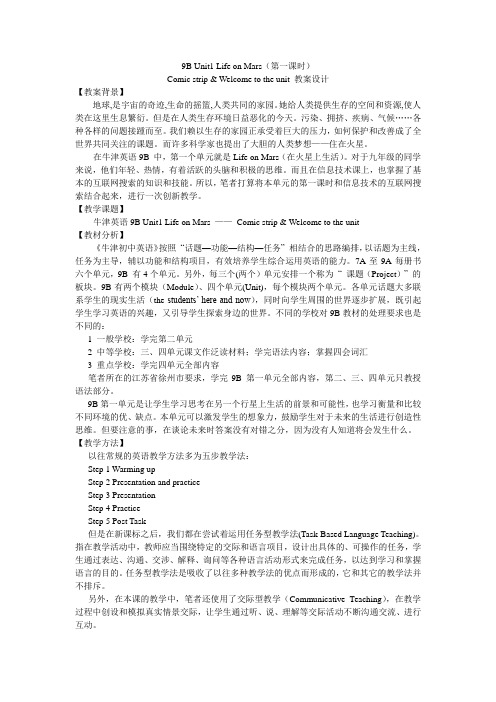
9B Unit1 Life on Mars(第一课时)Comic strip & Welcome to the unit 教案设计【教案背景】地球,是宇宙的奇迹,生命的摇篮,人类共同的家园。
她给人类提供生存的空间和资源,使人类在这里生息繁衍。
但是在人类生存环境日益恶化的今天。
污染、拥挤、疾病、气候……各种各样的问题接踵而至。
我们赖以生存的家园正承受着巨大的压力,如何保护和改善成了全世界共同关注的课题。
而许多科学家也提出了大胆的人类梦想——住在火星。
在牛津英语9B 中,第一个单元就是Life on Mars(在火星上生活)。
对于九年级的同学来说,他们年轻、热情,有着活跃的头脑和积极的思维。
而且在信息技术课上,也掌握了基本的互联网搜索的知识和技能。
所以,笔者打算将本单元的第一课时和信息技术的互联网搜索结合起来,进行一次创新教学。
【教学课题】牛津英语9B Unit1 Life on Mars ——Comic strip & Welcome to the unit【教材分析】《牛津初中英语》按照“话题—功能—结构—任务”相结合的思路编排,以话题为主线,任务为主导,辅以功能和结构项目,有效培养学生综合运用英语的能力。
7A至9A每册书六个单元,9B 有4个单元。
另外,每三个(两个)单元安排一个称为“课题(Project)”的板块。
9B有两个模块(Module)、四个单元(Unit),每个模块两个单元。
各单元话题大多联系学生的现实生活(the students’ here and now),同时向学生周围的世界逐步扩展,既引起学生学习英语的兴趣,又引导学生探索身边的世界。
不同的学校对9B教材的处理要求也是不同的:1 一般学校:学完第二单元2 中等学校:三、四单元课文作泛读材料;学完语法内容;掌握四会词汇3 重点学校:学完四单元全部内容笔者所在的江苏省徐州市要求,学完9B 第一单元全部内容,第二、三、四单元只教授语法部分。
9B Unit1 Life on Mars (Vocabulary)教案

第三届全国“教学中的互联网搜索”优秀教案评选教案设计一、教案背景1.面向学生:中学2.学科:英语3.课时:14.学生课前准备:①.Work in pairs to discuss: What will the life be like on Mars?②.Free talk: What will I take if I have a chance to space?二、教学课题9B Unit1 Life on Mars (V ocabulary)三、教材分析本课时内容较少,主要是训练学生认读有关宇航员的一些器具名称,对于能力较强的学生可以给出简单的英文释意,并以游戏的形式促进学生重复记忆,兴趣记忆形成长效记忆。
通过话题讨论和各抒己见方式,既运用了重要句型又锻炼了口语表达能力,帮助学生再次学以致用。
Teaching aims:nguage goals:Key vocabulary:store, fix, surface, dried, pack, astronaut, digital, be fixed to, dried food,on the surface of, digital cameraTarget language:I think ···is more important than···I think ···is the most/least important2.Ability goalsTo recognize and name the items that astronauts use in space.To use the vocabulary related to the astronauts' equipment in practice.3.Moral goals:To make dialogues freely by using vocabulary and learn to work with others.Teaching important points:1.To use the vocabulary related to the astronauts' equipment in English.2.To talk about what is the most/least important on Mars.Teaching difficult points:To describe the astronauts' equipment in English.四、教学方法Discussion, situational approach, pair work.五.教学过程Step 1. Lead-in1.Ask the students to watch a short film about Yang Liwei, Fei Junlong and Nei Haisheng.【百度搜索】短片/v/b/15174056-1395886244.html短片/show/CQNK7hDbzK8Tmgma.htmlT.Hi,boys and girls.Do you know who ther are?Ss:Yes,they are Yang Liwei, Fei Junlong and Nei Haisheng.They are heroes.T.Yes.They are great astronauts.They are our country's pride.China is the third country to the moon. Which country is the first?Ss:America,then Russia.T.How clever you are!The topic for today's free talk is about astronauts.Can you tell me what they need to take with them?2.Discussion in groups.Tell them to discuss and list out the names of items.Step 2.Explanation.1.Show them some pictures about the names of items.【百度搜索】图片air tank/i?ct=503316480&z=&tn=baiduimagedetail&word=%D1%F5%C6%F8% B9%DE&in=13064&cl=2&lm=-1&st=&pn=4&rn=1&di=19299075585&ln=1971&fr=&fm=&fm q=1331018219748_R&ic=&s=&se=&sme=0&tab=&width=&height=&face=&is=&istype=#pn4 &-1&di19299075585&objURLhttp%3A%2F%%2F60%2F92%2F01300000 244479123631927400237.jpg&fromURLhttp%3A%2F%%2Fs%2F%25E6 %25B0%25A7%25E6%25B0%2594%2Fxgtupian%2F1%2F5&W550&H550&T7504&S40&TPj pg【百度搜索】图片digital camera/i?ct=503316480&z=&tn=baiduimagedetail&word=%CA%FD%C2%EB% CF%E0%BB%FA&in=6705&cl=2&lm=-1&st=-1&pn=0&rn=1&di=40951756290&ln=1997&fr= &fm=result&fmq=1331018341711_R&ic=0&s=0&se=1&sme=0&tab=&width=&height=&face= 0&is=&istype=2#pn0&-1&di40951756290&objURLhttp%3A%2F%%2Ff%2Fd 8%2Ffd8cb4f2d1537850a7c508966afc7218.jpeg&fromURLhttp%3A%2F%%2F goods-3052.html&W1024&H768&T8385&S224&TPjpeg【百度搜索】图片dried food/i?ct=503316480&z=&tn=baiduimagedetail&word=DRIED%20FOOD&in =21206&cl=2&lm=-1&st=-1&pn=6&rn=1&di=47174245965&ln=1990&fr=&fm=result&fmq=1 331018449080_R&ic=0&s=0&se=1&sme=0&tab=&width=&height=&face=0&is=&istype=2#pn 6&-1&di47174245965&objURLhttp%3A%2F%.my%2Fcenian%2Fimg%2F 12words2.png&fromURLhttp%3A%2F%.my%2F2011-yuncheng-data%2F %3Fi%3D2&W214&H230&T7288&S62&TPpng【百度搜索】图片helmet/i?ct=503316480&z=&tn=baiduimagedetail&word=%CC%AB%BF%D5 %CD%B7%BF%F8&in=14824&cl=2&lm=-1&st=-1&pn=8&rn=1&di=42548681070&ln=1978& fr=&fm=result&fmq=1331018551519_R&ic=0&s=0&se=1&sme=0&tab=&width=&height=&fac e=0&is=&istype=2【百度搜索】图片special boots/i?ct=503316480&z=&tn=baiduimagedetail&word=%D3%EE%BA%BD %D0%AC&in=26133&cl=2&lm=-1&st=-1&pn=0&rn=1&di=113616186705&ln=1998&fr=&fm =result&fmq=1331018677954_R&ic=0&s=0&se=1&sme=0&tab=&width=&height=&face=0&is =&istype=2#pn0&-1&di113616186705&objURLhttp%3A%2F%%2Fupload_pho tos%2F2008%2F12%2F20081226083340663.jpg&fromURLhttp%3A%2F%%2Fnews%2Ftop2007%252C148498.html&W450&H300&T8001&S48&TPjpg【百度搜索】图片notebook computer/i?ct=503316480&z=&tn=baiduimagedetail&word=notebook%20compute r&in=32098&cl=2&lm=-1&st=-1&pn=0&rn=1&di=47034202140&ln=1944&fr=&fm=result&fm q=1331018806095_R&ic=0&s=0&se=1&sme=0&tab=&width=&height=&face=0&is=&istype=2 #pn0&-1&di47034202140&objURLhttp%3A%2F%%2Fimg%2F16%2F224 0%2F709%2F4153e603.jpg&fromURLhttp%3A%2F%%2Flpch%2Fnoteboo k-computer-mini-laptop-sve10c.html&W971&H944&T8041&S62&TPjpg【百度搜索】图片power pack/i?ct=503316480&z=&tn=baiduimagedetail&word=%D3%EE%BA%BDp ower%20pack&in=16665&cl=2&lm=-1&st=-1&pn=17&rn=1&di=29053914885&ln=1611&fr=& fm=result&fmq=1331018857320_R&ic=0&s=0&se=1&sme=0&tab=&width=&height=&face=0 &is=&istype=2#pn17&-1&di29053914885&objURLhttp%3A%2F%.made-in-china.c om%2F2f0j01oBjThnYmbLpQ%2F%2525E9%252593%25259D%2525E7%252584%25258A% 2525E6%25259C%2525BA.jpg&fromURLhttp%3A%2F%%2Fshowroo m%2Fnbllhj0808%2Fproduct-detailwobmhcafhlpq%2F%25E9%2593%259D%25E7%2584%258 A%25E6%259C%25BA.html&W341&H341&T10285&S20&TPjpg【百度搜索】图片space sleeping bag/i?ct=503316480&z=&tn=baiduimagedetail&word=%D3%EE%BA%BDs pace%20sleeping%20bag&in=20855&cl=2&lm=-1&st=-1&pn=8&rn=1&di=99096793335&ln=1 999&fr=&fm=result&fmq=1331018902976_R&ic=0&s=0&se=1&sme=0&tab=&width=&height =&face=0&is=&istype=2#pn8&-1&di99096793335&objURLhttp%3A%2F%% 2Fresources%2Farticle%2Fstudent%2Fothers%2F0019%2Fc3%2Fc3yyx019.files%2Fimage024.j pg&fromURLhttp%3A%2F%%2Fresources%2Farticle%2Fstudent%2Fothers%2 F0019%2Fc3%2Fc3yyx019.htm&W116&H162&T12718&S2&TPjpg2.Ask the top students to explain the words in English, the others try to grasp what they said.Give them more help when they translate the words and affirm what they said to spread their minds.Then drill the words together.Step 3.Practice.1.Individual work.Have the students exercise Part A on their own.Ask one student to read an answer at a time and check the answer and pronunciations with the whole class.See if they can ask students to cover the description and just talk about the pictures,and give a brief description of them.2.Practice.①Do chain work with books closed.One student gives the description of the item and another student will give its name quickly.Do it one by one.Make sure all the students can know the vocabulary about the equipment that astronauts use in space.②Use the conversation of Part B as a model.Have a free talk in pairs first.Then ask one or two pairs to present their conversations to the class.Ask more able students to give reasons to support their ideas.Step 4.Game1.Show some pictures of the items astronauts use in space to the students.Form the class into smallgroups and ask them to tell the names of them quickly in English.The group which can give the answers most quickly and correctly can earn ten points,and the group which can get the most points is the winner.2.Give out a piece of paper to each student.Then read some words and ask students to draw the pictures on the paper.Form the students into pairs.Give out some paper to the students.One student draws a picture and describes it to his or her partner and the partner also draws a picture according to the description,then compare the pictures with each other.Step 5.Discussion【百度搜索】短片/show/ekx2AJ1GWssk4wsi.htmlAsk the students to discuss what equipment they are interested in and what they think is the most and what is the least important.Have students discuss them in pairs.Step6.Homework1.Recite the words and phrases in this class.2.Write a short passage about astronauts.六.教学反思本教案已用于实际教学,反思整节课,我有以下感受:本节课是将理论与综合实践知识相结合,使学生在复习旧知的基础上,强化对未知领域的了解,更深刻的认识到外太空与我们的生活息息相关。
九年级英语教案范文(10篇):Unit1LifeonMars、Unit1LifeonMars…等
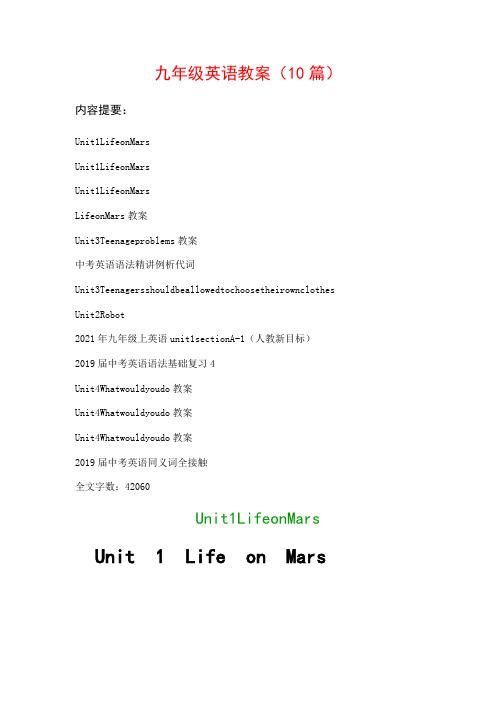
九年级英语教案(10篇)内容提要:Unit1LifeonMarsUnit1LifeonMarsUnit1LifeonMarsLifeonMars教案Unit3Teenageproblems教案中考英语语法精讲例析代词Unit3Teenagersshouldbeallowedtochoosetheirownclothes Unit2Robot2021年九年级上英语unit1sectionA-1(人教新目标)2019届中考英语语法基础复习4Unit4Whatwouldyoudo教案Unit4Whatwouldyoudo教案Unit4Whatwouldyoudo教案2019届中考英语同义词全接触全文字数:42060Unit1LifeonMars Unit1Life on Marsunit 1 life on mars一. 教学内容:unit 1 life on marsmain task:write your own guide to living on mars.tasks:1. use ‘can, could, may, might’ to talk about permission.2. express personal feelings concerning a future situation.二、重点、难点:comic strips1、how do you like life on mars? i hate it.你觉得火星上的生活怎么样?我讨厌它。
①how do you like?你觉得……怎么样?主要用来询问对方对某事的印象,也可以改为“what do you think of …”这一句型。
eg. how do you like this book? i think it’s a good book. how do you like china? i like it very much.what do you think of china?②hate 讨厌,不喜欢,后可跟名词、代词、动名词或动词不定式。
Life on Mars教案
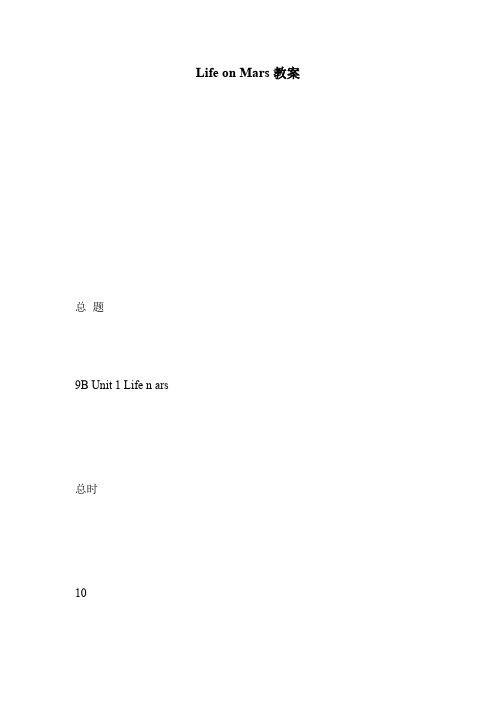
Life on Mars教案总题9B Unit 1 Life n ars总时10第1 时题i strip and ele t the unit 型新授教学目标知识目标T learn se ne rds and expressins能力目标T thin abut life in the future T disuss the advantages f a given situatin 情感目标T lve the nature and treasure ur glbe教学重点T learn se ne rds and expressins教学难点T disuss the advantages f a given situatin 前预习Previe the ne rds教学过程教学环节教师活动学生活动备札记Step 1 Lead-inStep 2 Presentatin Step 3 Listening and AnseringStep4: Reading and AtingStep 7 nslidatinStep 8 HerSa: hat is life lie n? hat life ill be lie n the earth in the future? hat ill pepled in the future? Sh se pitures :Revie “rbt ”, “helets”, “pills” and plain ars Explain the ntextf Part A Daniel is thining abut hat it ight be lie t live n ars He is paring life n earth t hat life ight be lie n ars and hether ars uld be a better r rse plae t live he the students’ansers As students t r in pairs t plete Part B As ne student t read ut the nae f eah bet in turn Then as students t sa hether the thin Daniel shuld tae the bet N Eddie and Hb are taling abut ars Listen t the dialgue beteen Eddie and Hb, and then tr t anser Des Eddie lie life n ars? h? Read the dialgue after the tape, and then at it ut 1苹果太高了,我够不到。
Unit1《LifeonMars》学案1(牛津译林九年级下)
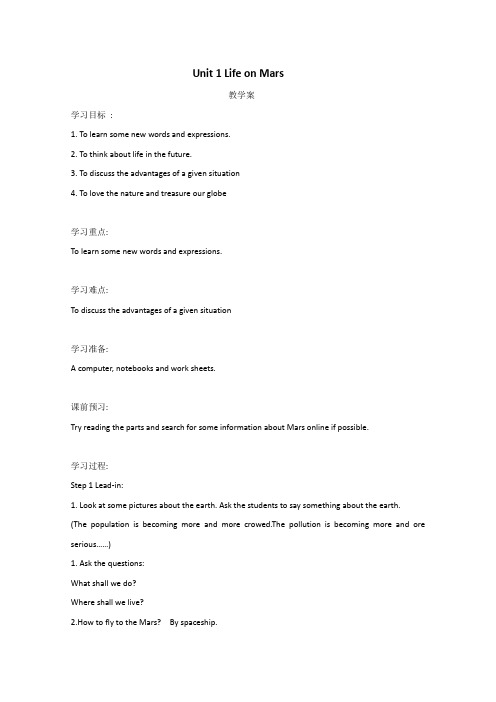
Unit 1 Life on Mars教学案学习目标:1. To learn some new words and expressions.2. To think about life in the future.3. To discuss the advantages of a given situation4. To love the nature and treasure our globe学习重点:To learn some new words and expressions.学习难点:To discuss the advantages of a given situation学习准备:A computer, notebooks and work sheets.课前预习:Try reading the parts and search for some information about Mars online if possible.学习过程:Step 1 Lead-in:1. Look at some pictures about the earth. Ask the students to say something about the earth. (The population is becoming more and more crowed.The pollution is becoming more and ore serious……)1. Ask the questions:What shall we do?Where shall we live?2.How to fly to the Mars? By spaceship.Step 2 . PresentationLearning sometning about the mars.Step 3. Listening and Answering1. Ask and answer the questions:Does Eddie like life on Mars?Why or why not?2. Show some pictures :Review “robot ”,and learn “helmets”.3. read and repeat the dialogue.Then ask some students to act it out.Step 4. Presentation1. Show some pictures : Compare the life on earth with the lifr on Mars.2. Ask students to work in pairs to complete Part A.3. Check the answers.4. Have a discussion and make a new dialouge like the following structure:A: Would you like to go to Mars?B: ….A: Why?B: Because ….What about you?A: I …because….Step 5 PresentationAsk students to work in pairs to complete Part B .Ask one student to read out the name of each object in turn.Then ask students to say whether they think Daniel should take the object.Then disciss: If I go to the moon, the things I will take with me are…I want to take …because …Step 6. Play a game:Have a debate.Step 7: Exercises:根据中文意思完成句子(每空一词)1.你觉得火星上的生活怎样?_____ do you ______ life on Mars?2.将来我们由机器人照顾。
Life On Mars教学设计
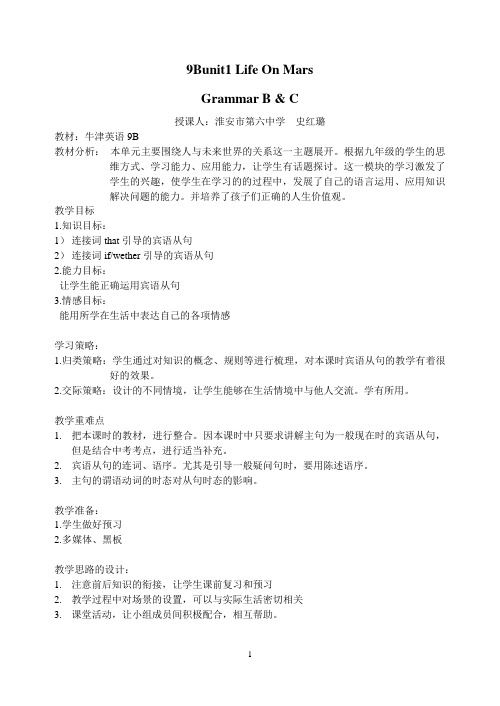
9Bunit1 Life On MarsGrammar B & C授课人:淮安市第六中学史红璐教材:牛津英语9B教材分析:本单元主要围绕人与未来世界的关系这一主题展开。
根据九年级的学生的思维方式、学习能力、应用能力,让学生有话题探讨。
这一模块的学习激发了学生的兴趣,使学生在学习的的过程中,发展了自己的语言运用、应用知识解决问题的能力。
并培养了孩子们正确的人生价值观。
教学目标1.知识目标:1)连接词that引导的宾语从句2)连接词if/wether引导的宾语从句2.能力目标:让学生能正确运用宾语从句3.情感目标:能用所学在生活中表达自己的各项情感学习策略:1.归类策略:学生通过对知识的概念、规则等进行梳理,对本课时宾语从句的教学有着很好的效果。
2.交际策略:设计的不同情境,让学生能够在生活情境中与他人交流。
学有所用。
教学重难点1.把本课时的教材,进行整合。
因本课时中只要求讲解主句为一般现在时的宾语从句,但是结合中考考点,进行适当补充。
2.宾语从句的连词、语序。
尤其是引导一般疑问句时,要用陈述语序。
3.主句的谓语动词的时态对从句时态的影响。
教学准备:1.学生做好预习2.多媒体、黑板教学思路的设计:1.注意前后知识的衔接,让学生课前复习和预习2.教学过程中对场景的设置,可以与实际生活密切相关3.课堂活动,让小组成员间积极配合,相互帮助。
教学过程Step1 Lead in1. Free talk2T: Who is he ?S: He is Fan Peng.T: How do you go to school ?Fan Peng: I go to school by bike .T: What does he say ? He says that he goes to school by bike .设计意图:呈现本班学生图片,提高学生积极性。
Step2 Presentation1.互助完成合并句子的练习并得出概念1). Our team will win. I’m sure.2). He has visited the Great Wall. He tells me.3). They have returned it already. I hear.T: An object clause functions as the object in a tense .3)Let the students work out the three rules of object clause by doing exercisesStep 3 work in groupsTalk about their mealsA: What do you have for breakfast?B: I have….for breakfast.A: Oh, I know (that) you have….for breakfast.让学生能够了解在生活中很多方面都可以用到自己的所学,并激发学生的兴趣,便于老师更好的了解学生。
Unit 1 Life on Mars_Main_task_精品教案

which ______in the air.
Activity Four Discussing about designing a guide
Step One Make a flow chart first in groups
Name of the guide:
___________________________
6. float in the air
___________ _
2. 探究学习
Activity Two Dealing with the flow chart on P19. Step One Read and understand Daniel’s flow chart on page 19. Step Two Ask and answer according to the flow chart.
_____ games instead.
There are also many ____ on Mars. They sell______ and food. The
public transport system is specially _______ to be______, and it
produces no air______. If you want to drive, you can buy a car
on Mars will be like.
There are strange and wonderful ________ on Mars. They are
usually friendly. Theers usually ________ these animals away with ________.
九年级英语Life on Mars教案

九年级英语Life on Mars教案Unit 1 Life on Mars 一、基础词汇 (n.) 1. 头盔 2. 机器人 3. 形式 4. 药片 5. 网络 6. 吉他 7. 太阳镜 8. 帐篷 9. 行星 10. 交通工具 11. 力量 12. 速度 13. 人类 14. 科学家 15. 移居者 16. 宇宙飞船 17. 药 18. 恒星 19. 任务 20. 箱 21. 味觉 22. 质量23. 能量 24. 背包 25. 宇航员 (v.) 1. 想象 2. 开发 3. 漂浮 4. 连接 5. 呼吸 6. 系,扎 7. 描述 8. 放松 9. 比较_____________ (adj.) 1. 拥挤的 2. 被污染的 3. 确定的 4. 流行的 5. 令人愉快的 6. 各种各样的 7. 干的 8. 正常的 9. 公共的 (adv.) 1. 专门地 2. 怀着希望地二、重点词组 1. 难以想象 2. 到2100年 3. 目前 4. 变得越来越拥挤,污染 5. 以光速的一半 6. 对早期的定居者来说是一个问题 7. 八分之三的 8. 使许多人感觉不舒服 9. 漂浮在太空 10. 在许多方面 11. 和……连接 12. 以……的形式三、句型结构 1. Our own planet, Earth is becoming more and more crowded and polluted. (more and more 越来越……) 1) 南京正变得越来越美。
Nanjing _____ __ . 2)这种长筒靴可能会变得越来越时髦。
The boots will probably become . 2. There will be many different designs for settlers to choose from. (注意动词后面的介词) 我不知道我有问题的时候和谁谈谈。
I don’t know whom I can ____ when I have problems. 3. Our spacecraft are too slow to carry large numbers of people to Mars. (注意a large number of 和the number of的区别) 1)我们学校学生的数量有2300人。
【范文】Unit 1 Life on Mars教案_1
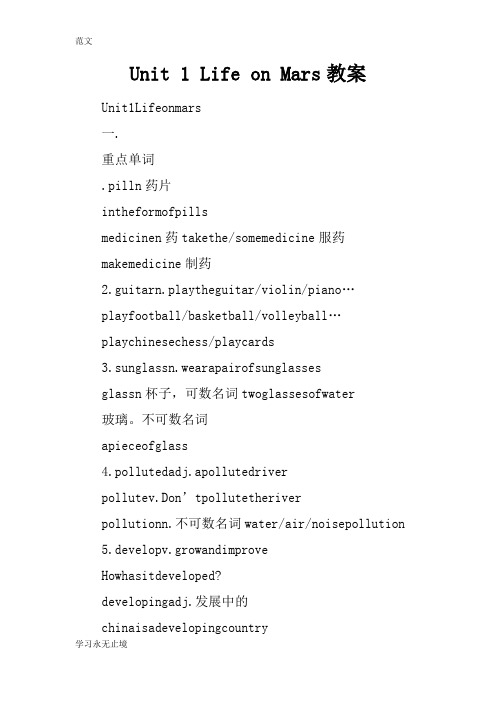
Unit 1 Life on Mars教案Unit1Lifeonmars一.重点单词.pilln药片intheformofpillsmedicinen药takethe/somemedicine服药makemedicine制药2.guitarn.playtheguitar/violin/piano…playfootball/basketball/volleyball…playchinesechess/playcards3.sunglassn.wearapairofsunglassesglassn杯子,可数名词twoglassesofwater玻璃。
不可数名词apieceofglass4.pollutedadj.apollutedriverpollutev.Don’tpollutetheriverpollutionn.不可数名词water/air/noisepollution 5.developv.growandimprove Howhasitdeveloped?developingadj.发展中的chinaisadevelopingcountrydevelopedadj.发达的Americaisadevelopedcountry.developmentnTherehavebeenseveralnewdevelopmentsinel ectronics.6.populationn.what’sthepopulationofchina?=Howmanypeoplearethereinchina?7.discussionn.Theprogrammestartedwithadiscussionabo uttheproblem.discussvt.shallwediscussthematterlatter?8.dryv.烘干Pleasedrytheseclothes.adj.干燥的Insummeritisverydry.driedadj,干的,干缩的Driedfoodcanbestoredformanymonths.9.imaginev.(1)后接名词或代词youcan’timaginetheirwords.(2)后跟动名词Trytobeimaginebeingonthemoon.(3)后跟从句Don’timaginethatyouaretheonlypersonintrouble.0.taste(1)link.vThesedumpingstastegood(2)n.Doyouhaveatasteofthisgreentea?1.human/people/personhuman主要指“人类,人”;people意为“人们”,着重指全体,是单数形式,但表达复数概念,等于menandwomen;person也可以作“人,人们”着重指个人方面,可以说twopersonshuman--humans2.certainadj.becertainofsth,/doingsth.sureadj.certain与sure的含义和用法大致相同,但certain侧重于表示有确定依据或事实,语气比sure强,多作表语,主语可以是物也可以是人;sure多指主观上相信某人或确定某事,主语一般是人.Itiscertainthatnobodylikeswaiting.Areyousureyouborrowedthebookfromthelibrary?pareAwithB;compareAandBeg.wecarefullycomparethefirstreportwiththesecond.Itisinterestingtocomparetheirheightandourweight/4.crowdedadj.可以作定语也可以作表语,意为“挤满的,拥挤的”常用结构是becrowdedwithsth.ThisisthemostcrowdedstreetinShanghai.Thebusiscrowdedwithpeoplewhogotowork.5.anumberof,thenumberof的区别anumberof=numbersof+可数名词的复数+动词形式为复数AnumberofvisitorscometoSuzhoueveryday.thenumberof+名词的复数+动词的三单意思是“……的总和数量Thenumberofthestudentsinourclassis65.6.athalfthespeedoflight以光速的一半(行驶),atEg:Thecarisrunningat80kilometresanhour.Iboughtitatalowprice.7.three-eighths八分之三,在分数词的表述中,记住口诀“分子基数词分母序数词,分子大于1,分母加s”。
[小初高学习]Unit 1 Life On Mars上课学习上课学习教案
![[小初高学习]Unit 1 Life On Mars上课学习上课学习教案](https://img.taocdn.com/s3/m/ae8df27633687e21af45a9f6.png)
Unit 1 Life On Mars教案Unit1Lifeonmars教案Grammar二、教学内容:9BUnit1Lifeonmars三、课型:Grammar四、教学目标.知识目标)掌握can,could和may,might的用法。
2)掌握that,if或whether引导的宾语从句的用法。
2.能力目标)能够运用can,could和may,might来具体表示请求或给予许可。
2)能够运用that,if和whether引导的宾语从句转述信息。
五、教学重难点.重点:)can,could和may,might的礼貌程度上的区别。
2)宾语从句that,if/whether的构成及用法。
2.难点:if或whether引导的宾语从句的语序。
第二部分教学流程用时:18分钟Step1Lead-in用时:分钟T:Hello,everyone!Gladtoseeyouagain.Todaywearegoingt olearn’can,could,may,might’andtheobjectclausesintroducedby‘that‘,‘if/whether’.T:Firstlet’slookatGrammarAandlearnhowtouse ‘can,could,may,might‘.Step2GrammarAUsing‘can’,‘could’,‘may’,‘might’T:Nowhe’saskingotherpeopleforpermission.Lookatthequestionsa ndpayattentiontothemodelverbsheuseswhenhewantstoask forpermissionfromdifferentpeople.kitty,canIborrowyourdictionary?mr.Green,couldIaskyousomequestionsplease?Excuseme,sir.mayIhavealookatthenameofyourbook?T:canyoutellmethedifferencesbetweenthethreesentences: T:---Inthe1stsentence,///Simonuses‘can’toaskhisfriendkittyaquestionbecauseit’sinformal.‘can’isalwaysusedwithfriends.---Inthe2ndsentence,///Simonuses“could’toaskhisteachermr.wuaquestionbecauseit’sformal.“could”isalwaysusedwithteachersorotheradults.---inthe3rdsentence,///Simonuses“may’toaskastrangeraquestionbecauseit’sformalandpolite.“may”isalwaysusedwithstrangersandpeopleyourespect.---Herepaymoreattentionto “might”.mightisveryformalandit’sverypolitebutrarelyused.eg:mightIuseyourcomputer,mr.wu?※Theyallexpresspermission.(他们都用于表示请求和允许。
- 1、下载文档前请自行甄别文档内容的完整性,平台不提供额外的编辑、内容补充、找答案等附加服务。
- 2、"仅部分预览"的文档,不可在线预览部分如存在完整性等问题,可反馈申请退款(可完整预览的文档不适用该条件!)。
- 3、如文档侵犯您的权益,请联系客服反馈,我们会尽快为您处理(人工客服工作时间:9:00-18:30)。
Unit 1 Life On Mars教案Unit1Lifeonmars教案Grammar二、教学内容:9BUnit1Lifeonmars三、课型:Grammar四、教学目标.知识目标)掌握can,could和may,might的用法。
2)掌握that,if或whether引导的宾语从句的用法。
2.能力目标)能够运用can,could和may,might来具体表示请求或给予许可。
2)能够运用that,if和whether引导的宾语从句转述信息。
五、教学重难点.重点:)can,could和may,might的礼貌程度上的区别。
2)宾语从句that,if/whether的构成及用法。
2.难点:if或whether引导的宾语从句的语序。
第二部分教学流程用时:18分钟Step1Lead-in用时:分钟T:Hello,everyone!Gladtoseeyouagain.Todaywearegoingt olearn’can,could,may,might’andtheobjectclausesintroducedby‘that‘,‘if/whether’.T:Firstlet’slookatGrammarAandlearnhowtouse ‘can,could,may,might‘.Step2GrammarAUsing‘can’,‘could’,‘may’,‘might’T:Nowhe’saskingotherpeopleforpermission.Lookatthequestionsa ndpayattentiontothemodelverbsheuseswhenhewantstoask forpermissionfromdifferentpeople.kitty,canIborrowyourdictionary?mr.Green,couldIaskyousomequestionsplease?Excuseme,sir.mayIhavealookatthenameofyourbook?T:canyoutellmethedifferencesbetweenthethreesentences: T:---Inthe1stsentence,///Simonuses‘can’toaskhisfriendkittyaquestionbecauseit’sinformal.‘can’isalwaysusedwithfriends.---Inthe2ndsentence,///Simonuses“could’toaskhisteachermr.wuaquestionbecauseit’sformal.“could”isalwaysusedwithteachersorotheradults.---inthe3rdsentence,///Simonuses“may’toaskastrangeraquestionbecauseit’sformalandpolite.“may”isalwaysusedwithstrangersandpeopleyourespect.---Herepaymoreattentionto “might”.mightisveryformalandit’sverypolitebutrarelyused.eg:mightIuseyourcomputer,mr.wu?※Theyallexpresspermission.(他们都用于表示请求和允许。
)T:ok.Let’sdosomeexercises.T:Let’schecktheanswers.Dad,couldItakeyourcamera?yes,youcan.2mayIborrowthishelmet,madam?No,youmaynot.3canIborrowyourboots,mike?yes,youcan.T:canyougivemetheanswerstothesequestionsabout ‘can,could,may,might’?can/couldyougotothezootomorrow?----wecananswer:--yes,youcan.orNo,youcannot/can’t.2may/mightIuseyourcomputer,mrwu?----wecananswer:--yes,youmay.orNo,youmaynot/can’t.T:Here‘could,might’donotmean ‘thepasttense’,butmean‘morepolite’.T:Nowpleasewritesentencestoaskforpermissioninthefol lowingsituations.lookatthe1stSituationIfyouareonabusandthepersoninfrontofyouhasthewindowo penandItstartstorainandyou’regettingwet.Howdoyouaskhimforpermission?---wecanask:mayIclosethewindow?Becauseit’sformalandpolitetouse‘may’whenweaskastrangeronthebusforpermission.T:Lookatthe2ndSituationIfyourcousiniswatchingaboringprogrammeonTV.whatdoyo usaytoaskhertochangethechannel.T:wecansay:----canIchangethechannel?Becauseit’sinformaltouse‘can’toaskfriendsforpermission.T:Lookatthe3rdSituationIfyouruncleandaunthaveinvitedyoutojointheminawalkin theparkandyouwanttotakeyourdogwithyou.///whatdoyousaythen?--That’sright.wecansay:‘couldIbringmydog?’Becauseit’sformaltouse‘could’toaskadultsforpermission.Step3Theobjectclausesintroducedby‘that’T:LookatGrammarB.Let’slearn‘that‘clause)Earthisbecomingmoreandmorecrowdedandpolluted.whatdoesDanielthink?---DanielthinksthatEarthisbecomingmoreandmorecrowde dandpolluted.2)Peoplewillliveontheplanetmarsbytheyear2100.whatdoesDanielthink?---Good.Danielthinksthatpeoplewillliveontheplanetma rsbytheyear2100.3)Therobotwilldomostofthework.whatdoesDanielthink?---yes,Danielthinksthattherobotwilldomostofthework.T:Nowcanyouputthesetwosentenceswith‘that’?T:Let’sdosomeexercises.…Haveyoufinished?Nowlet’schecktheanswers.)He’llbebackinamonth.--Ihearhewillbebackinamonth.2)IhavebeentotheGreatwallonce.--HetellsmehehasbeentotheGreatwallonce.T:ok.canyoufindouttherulesaboutobjectclausesintroduce dby‘that’?Tipswecanuse‘that’clausetoreplaceanobjectaftertheverbinasentence.(我们可以用that从句来代替一个宾语连接跟在动词后面做宾语。
)2Thewordorderintheobjectclauseisjustthesameasthatinthestatement.(从句中语序保持不变。
)3Sometimeswecanleavetheconnective“that”outintheobjectclause.(有时连接词that也可以省略不用。
)T:Itseemsterriblyeasyforyou,right?Let’sdomorepractice.canyoujointhefollowingsentenceswith objectclausesintroducedby‘that’?[:] )Peoplethink…Humansonmarshavetowearspecialbootstomakethemselvesh eavier.--Peoplethinkthathumansonmarshavetowearspecialboots tomakethemselvesheavier.2)Somescientistsdon’tbelieve…Thejourneytomarswillbeverycomfortable.--Somescientistsdon’tbelievethatthejourneytomarswillbeverycomfortable.T:canyoufindouttheobjectclausesinthefollowingsenten ces.writean“o“foranobjectclauseandan“N”forasentencewithoutone.[:])Theseplantswillproducefoodandoxygenthatweneed.2)Scientistsshouldbeabletodevelopplantsthatgrowonma rs.3)Peoplethinkthathumansonmarshavetowearspecialboots tomakethemselvesheavier.4)weallknowthatmarsisaplanetinthesolarsystem.5)Thejourneytomarscouldtakeonlyaveryshorttimeinspac eshuttlesthattravelathalfthespeedoflight.6)Somescientistsdonotbelievethatthejourneytomarswil lbeverycomfortable.T:Let’schecktheanswerstogethernow.[:学|科|网Z|X|X|k])Theseplantswillproducefoodandoxygenthatweneed.---Here‘thatweneed’isnotanobjectclausebecauseit’snotafteraverb.Soit’sN.(在这句中‘thatweneed’不是宾语从句,因为它不在动词后面。
